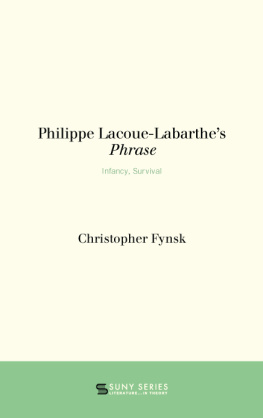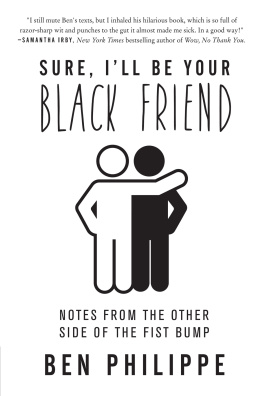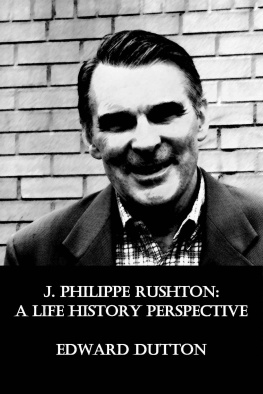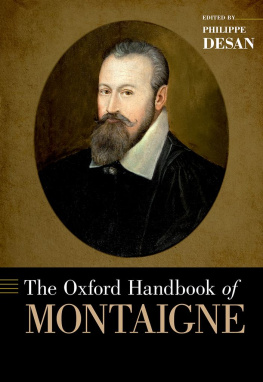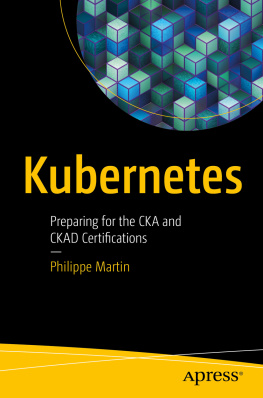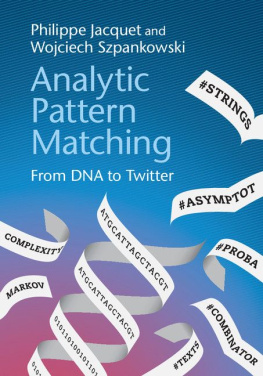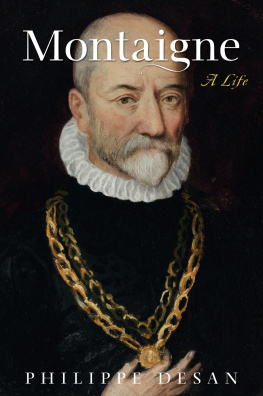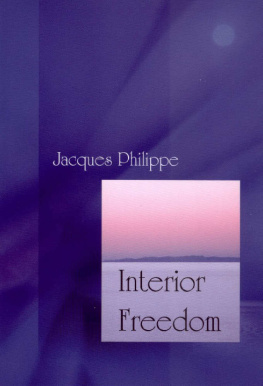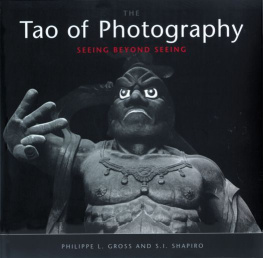Christopher Fynsk - Philippe Lacoue-Labarthes Phrase
Here you can read online Christopher Fynsk - Philippe Lacoue-Labarthes Phrase full text of the book (entire story) in english for free. Download pdf and epub, get meaning, cover and reviews about this ebook. year: 2016, publisher: State University of New York Press, genre: Religion. Description of the work, (preface) as well as reviews are available. Best literature library LitArk.com created for fans of good reading and offers a wide selection of genres:
Romance novel
Science fiction
Adventure
Detective
Science
History
Home and family
Prose
Art
Politics
Computer
Non-fiction
Religion
Business
Children
Humor
Choose a favorite category and find really read worthwhile books. Enjoy immersion in the world of imagination, feel the emotions of the characters or learn something new for yourself, make an fascinating discovery.
- Book:Philippe Lacoue-Labarthes Phrase
- Author:
- Publisher:State University of New York Press
- Genre:
- Year:2016
- Rating:3 / 5
- Favourites:Add to favourites
- Your mark:
- 60
- 1
- 2
- 3
- 4
- 5
Philippe Lacoue-Labarthes Phrase: summary, description and annotation
We offer to read an annotation, description, summary or preface (depends on what the author of the book "Philippe Lacoue-Labarthes Phrase" wrote himself). If you haven't found the necessary information about the book — write in the comments, we will try to find it.
Philippe Lacoue-Labarthes Phrase — read online for free the complete book (whole text) full work
Below is the text of the book, divided by pages. System saving the place of the last page read, allows you to conveniently read the book "Philippe Lacoue-Labarthes Phrase" online for free, without having to search again every time where you left off. Put a bookmark, and you can go to the page where you finished reading at any time.
Font size:
Interval:
Bookmark:

PHILIPPE LACOUE-LABARTHES
PHRASE

SERIES EDITORS
David E. Johnson (Comparative Literature, SUNY Buffalo)
Scott Michaelsen (English, Michigan State University)
SERIES ADVISORY BOARD
Nahum D. Chandler (African American Studies, University of California, Irvine)
Rebecca Comay (Philosophy and Comparative Literature, University of Toronto)
Marc Crpon (Philosophy, cole Normale Suprieure, Paris)
Jonathan Culler (Comparative Literature, Cornell)
Johanna Drucker (Design Media Arts and Information Studies, UCLA)
Christopher Fynsk (Modern Thought, Aberdeen University)
Rodolphe Gasch (Comparative Literature, SUNY Buffalo)
Martin Hgglund (Comparative Literature, Yale)
Carol Jacobs (Comparative Literature & German, Yale University)
Peggy Kamuf (French and Comparative Literature, University of Southern California)
David Marriott (History of Consciousness, University of California, Santa Cruz)
Steven Miller (English, University at Buffalo)
Alberto Moreiras (Hispanic Studies, Texas A&M University)
Patrick ODonnell (English, Michigan State University)
Pablo Oyarzn (Teora del Arte, Universidad de Chile)
Scott Cutler Shershow (English, University of California, Davis)
Henry Sussman (German and Comparative Literature, Yale University)
Samuel Weber (Comparative Literature, Northwestern)
Ewa Ziarek (Comparative Literature, SUNY Buffalo)
PHILIPPE LACOUE-LABARTHES
PHRASE
Infancy, Survival
CHRISTOPHER FYNSK
S TATE U NIVERSITY OF N EW Y ORK P RESS
P UBLISHED BY S TATE U NIVERSITY OF N EW Y ORK P RESS , A LBANY
2017 State University of New York
All rights reserved
Printed in the United States of America
No part of this book may be used or reproduced in any manner whatsoever without written permission. No part of this book may be stored in a retrieval system or transmitted in any form or by any means including electronic, electrostatic, magnetic tape, mechanical, photocopying, recording, or otherwise without the prior permission in writing of the publisher.
For information, contact State University of New York Press, Albany, NY
www.sunypress.edu
Production, Laurie D. Searl
Marketing, Michael Campochiaro
Library of Congress Cataloging-in-Publication Data
Names: Fynsk, Christopher, 1952 author.
Title: Philippe Lacoue-Labarthes Phrase : infancy, survival / Christopher Fynsk.
Description: Albany : State University of New York Press, 2017. | Series: SUNY series, literature in theory | Includes bibliographical references and index.
Identifiers: LCCN 2016020986 (print) | LCCN 2016038965 (ebook) | ISBN 9781438463476 (hardcover : alk. paper) | ISBN 9781438463490 (e-book)
Subjects: LCSH: Lacoue-Labarthe, Philippe. Phrase . | Lacoue-Labarthe, PhilippeCriticism and interpretation.
Classification: LCC PQ2672.A2417 Z49 2017 (print) | LCC PQ2672. A2417 (ebook) | DDC 848/.91407dc23
LC record available at https://lccn.loc.gov/2016020986
10 9 8 7 6 5 4 3 2 1
The Throw of Infancy
In the course of a visit to Brooklyn in the winter of 2000, Philippe Lacoue-Labarthe presented me with a copy of Phrase , a book he had been composing for almost twenty-five years. I answered this gesture on the same occasion by presenting him with a copy of Infant Figures , a text on which I had been working over a period in which he and I had not been in frequent contacthence his surprise. But I would be no less surprised when I discovered, after extensive work with Phrase , just how singular a crossing this was.
Infant Figures was a book devoted, in its core section, to the first not first principles, but first figurations, or, more precisely, primary figurations of an original exposure that haunts all conscious life. That acquiescence, I suggested, would be the source of a latent relation on the order of an opening , a yes that would escape the hold of the negative, thus giving us the grounds for envisioning a relationality that would exceed not just the hold of any dialectic, but the power of the negative from which dialectic takes its movement. This opening would offer, for the one writing later, the possibility of another relation to alterity, and with this another thought of the ethical relation. The evidence of an originary need for figuration offers, at the same time, a vital perspective on the conditions and character of that writing.
For Philippe Lacoue-Labarthe, the thought of the primal exposure from which I proceeded in Infant Figures had been no less gripping, no less exigent. That we should have met there in our trajectories of writing should not ultimately have been so surprising, given what we had always shared in core attunements and our common engagement with the question of human finitude, a question opened crucially in the last century by Heidegger and then translated powerfully in modern French thought by a wide range of writers that included Blanchot and Lacan. Our common friendship with Jean-Franois Lyotard, who had taken up the topic of infancy in the late 1980s would also have prepared the way for this meeting. But the real extent of Lacoue-Labarthes preoccupation with the question of infancy was not really visible until the publication of Phrase , this powerful piece of poetry, prose-poetry, dramatic writing, and reflection that he
Circumstances relating to Lacoue-Labarthes health in the last two decades of his life, and then his death in 2008, delayed my response to the book. I felt it required a reading no less searching and honest than Lacoue-Labarthes efforts in composing it. Having lived in close proximity with him (even in the same house) over several of the years represented in its pages, having shared the idyll and tumult that was Strasbourg in the late 1970s and 1980s and much more that Lacoue-Labarthe could only allude to in Phrase , the task demanded of me a time of maturation. It probably required, as well, the work that I devoted to Maurice Blanchot in the interim, for reasons that will become apparent in the reading that follows. And it required a very significant engagement with the text, one that carried me well beyond the specific theme of infancy. The figurations of infancy and childhood (and of birth) in Phrase had to be read from the history of renunciation recounted by one who identifies himself in passing, after Hlderlin and Nietzsche, as a child with grey hair. But I will attempt to show how this history rejoined Blanchots meditation on what it might mean to write in relation to the impossible necessary death which the dying infans could figure only in its very effacement. By renunciation, Lacoue-Labarthe attempted an approach to the acquiescence Blanchot had evoked in his meditation on infancy and to the step or passage it promised. The legacy of infancy, in this case, was one Lacoue-Labarthe had taken over from Blanchot in an effort to bring to language the grounds of his literary experience. It was perhaps in part by Lacoue-Labarthes intercession (though in ways I cannot pretend to define) that it also became my own.

Infancy. I use the term to designate a condition and a period almost impossible to date because it is time when time is only forming, a phase where language is not yet language (or is coming about as such), where touches (tactile, auditory, visual, even internal) occur that cannot yet be psychically organized for want of a fully defined self, where the fact of desire begins to emerge as a forever preoccupying problem, where imitation and repetition, modulated by play, guide what can barely yet be called learning. It is a state, I would add, into which a young infant with sufficient maturity (after who knows how many months) will eventually find itself thrown and from which it will have taken the first mysteriously welcomed and welcoming steps toward a dawning world whose light the philosophers and poets have always struggled to name. For the infant in us, those steps will also always echo in a darkness that is the special concern of the analyst, but also, again, the poet.
Font size:
Interval:
Bookmark:
Similar books «Philippe Lacoue-Labarthes Phrase»
Look at similar books to Philippe Lacoue-Labarthes Phrase. We have selected literature similar in name and meaning in the hope of providing readers with more options to find new, interesting, not yet read works.
Discussion, reviews of the book Philippe Lacoue-Labarthes Phrase and just readers' own opinions. Leave your comments, write what you think about the work, its meaning or the main characters. Specify what exactly you liked and what you didn't like, and why you think so.

